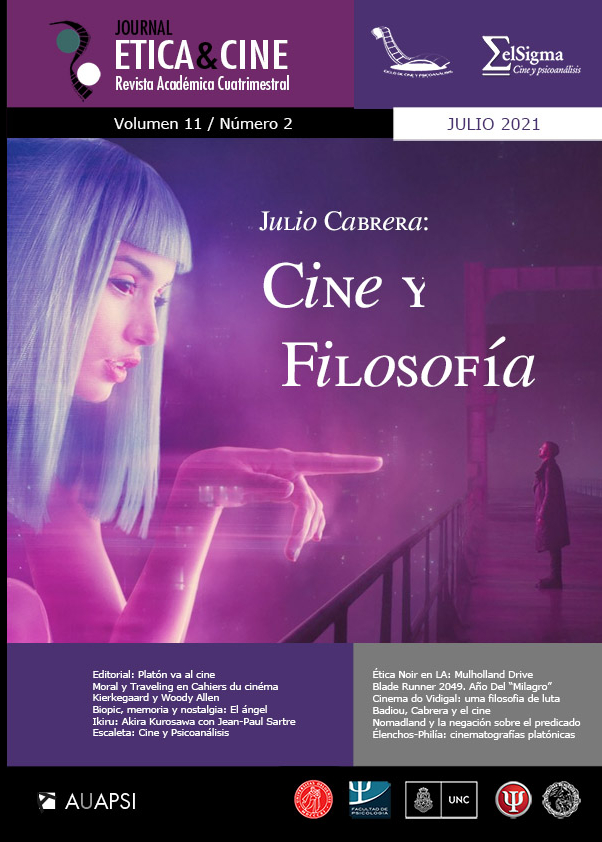«Bad faith», «past» and «death». A reading based on Jean-Paul Sartre’s philosophy
DOI:
https://doi.org/10.31056/2250.5415.v11.n2.34185Keywords:
Akira Kurosawa, Jean-Paul Sartre, French philosophy, Existentialism, Project, DeathAbstract
The cinematographic work of Akira Kurosawa has been analyzed from certain categories of that vast literary and philosophical movement that has been called «existentialism». The finitude, the anxiety, the absurd, the authenticity, the decision –typical «existentialist» motives–, run through much of his filmography. On this regard, the film Ikiru [To Live, 1952] is perhaps one of his most eloquent productions. Inspired by Tolstoy’s The Death of Ivan Ilych, Kurosawa’s work is set in the last months of the life of Kanji Watanabe, Head of the Tokyo Citizens’ Section, a minor office of a complex state bureaucracy that the film portrays as inoperative. His life changes at the root when he realizes that he has stomach cancer and has only one year to live. The film will show Watanabe’s various attempts to find meaning to his life. The purpose of this article is to offer an interpretation of the film based on some concepts included in L être et le néant [Being and Nothingness, 1943], Jean-Paul Sartre’s fundamental philosophical work. I wwill focus on the characteristic Sartrean notion of «bad faith», the relationship between the For-Itself and the «past», and the analysis of «death», in controversy with Martin Heidegger.
Downloads
References
Bazin, A. (1977). El cine de la crueldad. Mensajero D.L.
Bovens, L. (1999). Authenticity in Kurosawa. The Journal of Value Inquiry, (33), 227-237.
Château, D. (2005). Sartre et le cinema. Séguier-Atlantica.
Churchill, S. (2012). “«Authentic Begin-towards-Death» as the Theme of Akira Kurosawa’s (1952) film “Ikiru” [“to live”]. Heidegger’s (1927) Being and Time in Dialogue with Akira Kurosawa’s film Ikiru”. Aarhus Heidegger Seminar, October 2, 2012 [inédito]. https://www.academia.edu/29841322/_Authentic_Begin-towards-Death_as_the_Theme_of_Akira_Kurosawa_s_1952_film_Ikiru_to_live_
Garaudy, R. (1964). Perspectivas del hombre. Existencialismo, pensamiento católico, marxismo. Editorial Platina. [1959].
Gordon, J. (1997). Kurosawa’s existential masterpiece: A meditation on the meaning of life. Human Studies, 20, 137–151.
Grandío, M. (2010). Tiempo y perspectiva en la película Rashōmon de Akira Kurosawa. Vivat Academia, (111). http://www.ucm.es/info/vivataca/numeros/n111/Articulos111.pdf
Kaufmann, W. (1956). Existentialism. From Dostoievsky to Sartre. Meridian Books.
Kurosawa, A. (director), Jingo, M. (productor), (1950). Rashōmon [Película]. Daiei Film.
Kurosawa, A. (director), Sōjirō M. (productor), (1952). Ikiru [Vivir] [Película]. Toho.
Kurosawa, A. (1983). Something Like an Autobiography. Vintage Books. [Trad.: Audie E. Bock].
Nietzsche, F. (1979). Así habló Zaratustra. Alianza. [Trad. Andrés Sánchez Pascual]. [1885].
Prince, S. (1991). The Warrior’s Camera: The cinema of Akira Kurosawa. Princeton University Press.
Richie, D. (1970) The films of Akira Kurosawa. University of California Press.
Sartre, J. P. (1993). El ser y la nada. Altaya. [Trad.: Juan Valmar]. [1943].
Sartre, J. P. (1963). “El existencialismo es un humanismo”. En Existencialismo y humanismo. Sur. [1946].
Tolstoi, L. (2013). La muerte de Iván Ilich. Losada. [1886].
Trakas, M. (2017). Rashōmon. La memoria y su conexión con el pasado. Ética y Cine Journal, 7(3), 11-21.
Downloads
Published
How to Cite
Issue
Section
License

This work is licensed under a Creative Commons Attribution-ShareAlike 4.0 International License.
Los autores que publiquen en Ética y Cine Journal aceptan las siguientes condiciones:
Los autores/as conservan los derechos de autor © y permiten la publicación a Ética y Cine Journal, bajo licencia CC BY-SA / Reconocimiento - Reconocimiento-CompartirIgual 4.0 Internacional. La adopción de esta licencia permite copiar, redistribuir, comunicar públicamente la obra, reconociendo los créditos de la misma, y construir sobre el material publicado, debiendo otorgar el crédito apropiado a través de un enlace a la licencia e indicando si se realizaron cambios.

Este obra está bajo una licencia de Creative Commons Reconocimiento-CompartirIgual 4.0 Internacional.




